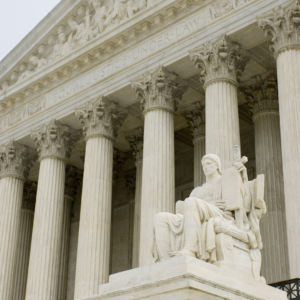Editor’s Note: For an alternative viewpoint, please see: Point: Is Money Corrupting U.S. Politics? No
Our system of campaign finance is badly broken and is deforming our democracy. The problem is the Supreme Court, not the Constitution.
In a series of 5-4 rulings, Chief Justice John Roberts and his conservative colleagues have rewritten the constitutional guarantee of freedom of speech, insisting that money is speech, that corporations are an essential part of “We the People,” and that the government’s only legitimate interest in limiting election spending and giving is to prevent bribery.
In decisions beginning with Citizens United v. FEC, the court’s conservative majority opened the floodgates to massive spending by corporations and the wealthy individuals who control them and made it possible — for the first time since the Watergate era — for the wealthiest of Americans to cut million-dollar checks. Free speech is a core constitutional value, but the Supreme Court has lost sight that the Constitution also ensures a democracy equally open to all and free from corruption.
This year, we’ve seen fewer and fewer people giving more and more money, much of it dark money that is difficult to trace because of loopholes in disclosure laws.
As the New York Times reported, during the first phase of the presidential election, 158 of the richest families in the United States, along with the corporations they control, contributed $176 million to the Republican and Democratic candidates for president. These top donors — largely backing Republican candidates — sought to use their money to enrich themselves at the expense of others, aiming to roll back regulations affecting their businesses as well as cut taxes, while shrinking entitlement programs that hardworking Americans rely on.
While money alone can’t buy elections — witness the failure of Jeb Bush despite his huge war chest — it can skew public policy in favor of the super-rich.
Big money can have an especially dramatic effect on the state and local level, where huge sums of money — often shielded from effective disclosure — can have a decisive effect.
That’s what occurred in Illinois when a handful of rich families — many of the same ones that have spent big in 2016 — poured millions to help elect Gov. Bruce Rauner, seeking to ensure that the new governor would enact policies favorable to them.
Elsewhere, the availability of dark money has expanded opportunities for corruption, with politicians all too willing to dance to the tune of huge financial backers, who often lurk in the shadows unbeknownst to the voters.
This is not the Constitution our Framers designed. Our Constitution creates a democratic system of government for “We the People of the United States,” not simply the wealthy few. Our system of government, James Madison insisted, was for “not the rich, more than the poor; not the learned, more than the ignorant; not the haughty heirs of distinguished names, more than the humble sons of obscure and unpropitious fortune. The electors are to be the great body of the people of the United States.”
Since then, “We the People” have repeatedly amended our Constitution to ensure political equality, prohibiting voting discrimination whether based on race, gender or age and eliminating the use of poll taxes. Ensuring a democracy based on principles of political equality runs through the Constitution.
Eliminating corruption, too, is a core constitutional commitment. Our Constitution’s Framers recognized that corruption was one of the greatest threats to government, and made sure to include a host of protections designed to ensure political integrity.
In Citizens United, Justice Anthony Kennedy equated corruption and bribery. The Framers did not have such a crabbed view. Rather than prohibiting bribery, they wrote into the Constitution rules designed to prevent even the appearance of corruption. The Framers sought to ensure — consistent with democratic principles — that, in the words of Madison, the government was dependent “on the great body of the people” and not “a favored class of it.”
Currently, there are four justices on the Supreme Court intent on further deregulating our system of money and politics and four justices who view Citizens United as a betrayal of the Constitution. Justice Ruth Bader Ginsburg has said, “If there was one decision I would overrule, it would be Citizens United. I think the notion that we have all the democracy that money can buy strays so far from what our democracy is supposed to be.”
At stake in the coming presidential election is whether the court will continue to unravel the fabric of our democracy, or reverse course and honor our Constitution’s promise that our democracy is for all persons.

